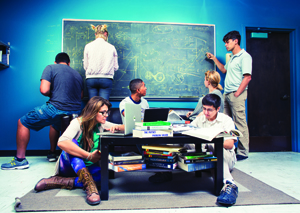
Students work in the SLUG with Enrico Ramirez-Ruiz (far right), professor of astronomy and astrophysics. (Photo by Elena Zhukova)
|
Visiting the supercomputer lab for undergraduates (SLUG) is a little like being transported onto the set of the Big Bang Theory.
It's cool to be geeky when you're surrounded by black leather couches and a handful of smart undergraduates talking about coding and data analysis.
SLUG is the brainchild of Enrico Ramirez- Ruiz, professor of astronomy and astrophysics. The three-year-old lab is designed for physics and astrophysics majors who want to learn to become independent scientists. It's also become a support group and coffee klatch for these young physicists, who need a place to vent and brainstorm.
Ramirez-Ruiz said he was inspired to create the lab because of an internship at Los Alamos National Laboratory in which he participated as an undergraduate at the Universidad Nacional Autónoma de México.
"That summer changed my life," said Ramirez-Ruiz, who went on to earn a Ph.D. in astronomy and astrophysics at the University of Cambridge (U.K.).
Ramirez-Ruiz is hoping to have a life-altering impact on the half-dozen students at the lab, who come from a diverse range of economic and cultural backgrounds.
Aaron Lopez (Oakes '15, physics) is new to SLUG. He transferred from Hartnell College in Salinas, and was introduced to Ramirez-Ruiz by a mentor.
"Enrico and the others have given me a better idea about what I want to do in life, more so than other experiences because I was never exposed to any such group work in the field before," said Lopez.
The students are all working on separate projects under the guidance of Ramirez-Ruiz and graduate student mentors. They work in the lab every day and check in with each other about research triumphs and frustrations.
Melinda Soares-Furtado (College Nine '13, physics) said it's that sense of camaraderie that attracted her to UC Santa Cruz. Soares-Furtado, first in her family to go to college, transferred from Gavilan College in Gilroy, where she excelled and was granted admission to several four-year universities.
"I chose to come here because people work as a team at UCSC," said Soares-Furtado. "We try to inspire one another."
There's also a healthy dose of competition mixed into the chemistry of the lab. The biggest angst-causing issues: Who will get into a top graduate school? Who will be published first?
Soares-Furtado is in her last year at the SLUG, and is currently applying to 13 different graduate schools. She studied for the GREs with fellow SLUG students.
Since its inception three years ago, graduates of the lab have gone on to top grad school programs in astronomy and physics at universities including Princeton, Harvard, Columbia, UC Santa Barbara, UC Santa Cruz, Stanford, and Cambridge.
Andrea Derdzinski (Merrill '14, astrophysics) said working in the lab is great motivation. "You see someone advancing and you
feel like you need to hurry up and get your work done."
She added that working in the lab is very different from time in the classroom, where students usually tackle one topic at a time. "Here we have to piece it all together."
Monique Windju (Oakes '15, astrophysics) agrees that the SLUG is about more than just academic or practical knowledge. "We're learning how to learn," she said.
It can be a steep learning curve for students who are new to the lab.
Ivan Alvarado (College Eight '16, applied physics), a transfer student from Los Angeles Community College, says it's been a "pretty challenging transition."
"In school you get an assignment, but here you have to have the self-initiative where you have to look for things on your own," said Alvarado.
Soares-Furtado said her time in the lab has given her the self-confidence she needs to succeed in a male-dominated field.
"It seems like it should be commonplace to have a center like this," said Soares-Furtado. "If you're new to the field, I feel like this is something really important."


